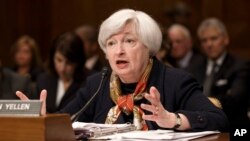Federal Reserve Chair Janet Yellen, taking a page from her predecessor, urged the U.S. Congress on Thursday to address the nation's long-term budget challenges, warning that the current course was unsustainable.
“We can see that going out 20, 30, 50 years without some further shifts in fiscal policy, it's projected that the ratio of debt to GDP will rise to unsustainable levels,” Yellen told the Senate Budget Committee.
“I would join my predecessor in saying that I do think it's important that the Congress address that issue,” she said.
In a second day of congressional testimony, Yellen said that a recent tightening of fiscal policy had been one of the “headwinds” that had undercut the Fed's efforts to foster a stronger economic recovery.
She said that a lessening of the drag from fiscal policy this year was one of the reasons officials at the U.S. central bank were expecting growth to quicken a bit this year.
“My predecessor asked, in a sense, that fiscal policy should do no harm,” Yellen said referring to Ben Bernanke, who stepped down as Fed chief at the end of January.
“I do want to agree with my predecessor in emphasizing, though, that long-run sustainability of fiscal policy and the debt is something that is very important.”
Pressed on whether reforms of so-called entitlement programs would be needed to put the budget on a sustainable patch, or whether tax hikes alone could fix the problem, she declined to answer.
“I don't intend to weigh in on particulars,” she said, suggesting that - like Bernanke - she would avoid giving Congress specific advice on fiscal policy.
As she had on Wednesday before the Joint Economic Committee, Yellen indicated the Fed was likely to keep benchmark overnight interest rates near zero for some time given the “considerable degree of slack” in the U.S. labor market.
She also again cautioned that weakness in the housing sector could undermine her expectation that the economy would grow “somewhat faster” this year than last.
“The recovery of the housing sector is very important, to see that ongoing, is important to our recovery and has been a very important factor in the downturn,” Yellen said.
She also repeated her warning of the possibility of “adverse developments abroad,” such as heightened geopolitical tensions or an intensification of financial stress in emerging markets, and said that was a risk the U.S. central bank also needed to watch closely.
“We can see that going out 20, 30, 50 years without some further shifts in fiscal policy, it's projected that the ratio of debt to GDP will rise to unsustainable levels,” Yellen told the Senate Budget Committee.
“I would join my predecessor in saying that I do think it's important that the Congress address that issue,” she said.
In a second day of congressional testimony, Yellen said that a recent tightening of fiscal policy had been one of the “headwinds” that had undercut the Fed's efforts to foster a stronger economic recovery.
She said that a lessening of the drag from fiscal policy this year was one of the reasons officials at the U.S. central bank were expecting growth to quicken a bit this year.
“My predecessor asked, in a sense, that fiscal policy should do no harm,” Yellen said referring to Ben Bernanke, who stepped down as Fed chief at the end of January.
“I do want to agree with my predecessor in emphasizing, though, that long-run sustainability of fiscal policy and the debt is something that is very important.”
Pressed on whether reforms of so-called entitlement programs would be needed to put the budget on a sustainable patch, or whether tax hikes alone could fix the problem, she declined to answer.
“I don't intend to weigh in on particulars,” she said, suggesting that - like Bernanke - she would avoid giving Congress specific advice on fiscal policy.
As she had on Wednesday before the Joint Economic Committee, Yellen indicated the Fed was likely to keep benchmark overnight interest rates near zero for some time given the “considerable degree of slack” in the U.S. labor market.
She also again cautioned that weakness in the housing sector could undermine her expectation that the economy would grow “somewhat faster” this year than last.
“The recovery of the housing sector is very important, to see that ongoing, is important to our recovery and has been a very important factor in the downturn,” Yellen said.
She also repeated her warning of the possibility of “adverse developments abroad,” such as heightened geopolitical tensions or an intensification of financial stress in emerging markets, and said that was a risk the U.S. central bank also needed to watch closely.





